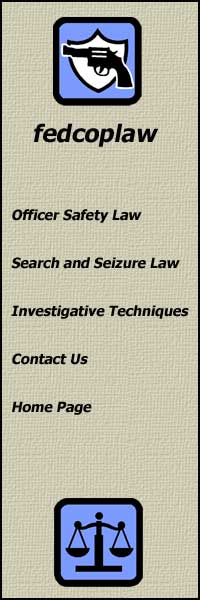 |
|
INVESTIGATIVE TECHNIQUES LAW
Copyright 2001- 2018 Edward S. Armstrong, Jr.
Copyright 2001- 2018 Edward S. Armstrong, Jr.
All law enforcement officers must confer with their training officers, legal advisors and prosecutors regarding the following legal issues. State law can be more restrictive (pro-defendant) than Federal law. Federal circuit courts of appeal often disagree with other Federal circuit courts on issues not yet decided by the United States Supreme Court. Also, lower courts (State and Federal) sometime disagree on what a Supreme Court decision means. The following statements are not to be taken as legal advice.
1. WIRETAPPING, BUGGING – If Police intend to intercept (listen and record) the telephone communications of suspects, or the private oral communications of suspects, or the private electronic communications of suspects during transmission, (e-mail, voice mail, fax, text messaging pager), Police must first obtain a Title III Court Order (super Search Warrant ),18 U.S.C. § 2510 – 2522. Any person who violates this statute commits a felony.
Federal and State crimes that permit a T-III Court Order are listed in 18 U.S.C. § 2516, such as: murder, bombing, kidnapping, robbery, drug dealing.
Exceptions, recording a communication without a T-III Court Order is lawful if:
a. A Police Officer is a party (participant) to a conversation, 18 U.S.C. § 2511 (2)(c).
b. Police have prior consent from a cooperating witness, 18 U.S.C. § 2511 (2)(c).
c. The suspect has no reasonable expectation of privacy (no REP) in an oral communication, 18 U.S.C § 2510 (2).
Examples under (c): A police undercover officer overheard and taped a conversation even though he was not a party to the conversation, U.S. v. Langonia, 177 F.3d 1179 (10th 1999); Police secretly recorded statements made by suspects to each other while seated in a known Police car, U.S. v. Turner, 209 F3d 1198 (10th Cir. 2000); Police heard with their naked ear one side of a pubic telephone conversation, U.S. v. Muckenthaler, 584 F.2d 240 (8th Cir. 1978); Police, in a motel room lying in a prone position at connecting doors, heard with their naked ear a conversation in the adjoining motel room, U.S. v. Fisch, 474 F.2d 1071 (9th Cir. 1973).
2. CELL PHONES
Stored Communication Act, 18 U.S.C. § 2701-2712; 2703d Court Order
Cell Phone Wiretap - Dahda v. U.S., Supreme Court (2018)
Cell Phone Digital Information - Riley v. California, S.Ct. (2014) - No Search Incident to Arrest (SIA) Allowed!
Cell Phone Tracking of Suspect's Location, Carpenter v. U.S., S.Ct. (2018)
7 Days or More - Suspect's Consent, Search Warrant or Exigent Circumstances
6 Days or Less - Suspect's Consent, 18 USC 2703d Court Order or Exigent Circumstances
Exigency: Suspect's Location - U.S. v. Gilliam, 842 F.3d 801 (2nd Cir. 2016)
2703d Court Order: Suspect's Location - U.S. v. Riley, 858 F.3d 1012 (6th Cir. 2017)(7 Hrs)
Consent to Search Cell Phone - U.S. v. Thurman, 7th Circuit, 17-1598 (2018)
Border Search of Cell Phone - U.S. v. Touset, 11th Circuit, 17-11561 (2018), U.S. v. Kolsuz, 4th Circuit, 16-4687 (2018) (Border Searches of Electronic Devices, Department of Homeland Security, Directive 3340-049A (2018)(Basic searches versus advanced searches)).
Abandoned Cell Phone - U.S. v. Crumble, 8th Circuit, 16-4308 (2018)
Parolee Cell Phone - U.S. v. Pacheco, 10th Circuit, 16-3294 (2018)
Probationer Cell Phone - U.S. v. Lara, 815 F.3d 605 (9th Cir. 2016)
Exposing Cell Phone Screen - U.S. v. Morgan, 842 F.3d 1070 (8th Cir. 2016)
Carrying Cell Phone Into Prohibited Place - U.S. v. Jackson, 866 F.3d 982 (8th Cir. 2017)
Private Search of Cell Phone - U.S. v. Highbull, 8th Circuit, 17-2728 (2018)
Federal Search of Cell Phone Based on State SW - U.S. v. Castro, 6th Circuit, 17-1590(18)
3. PEN REGISTER, TRAP & TRACE - If Police want the telephone number dialed from or to a suspect’s telephone at the moment the call or e-mail occurs, a Court Order is required, 18 U.S.C. § 3121.
a. Telephone numbers dialed - no REP, Smith v. Maryland, 99 S.Ct. 2577 (1979)
b. E-mail to / from addresses, U.S. v. Forrester, 512 F.3d 500, 510 (9th Cir. 2008)
c. Internet Protocol (IP) Address - U.S. v. Ulbricht, 858 F.3d 71 (2nd Cir. 2017)
4. TELEPHONE RECORD - Police may obtain telephone subscriber information and the phone numbers called by a suspect in the past the following ways: Search Warrant,
§ 2703d Court Order, Grand Jury subpoena, formal request, Consent of the suspect, or an Administrative Subpoena, 18 U.S.C. § 2703 (c)(2).